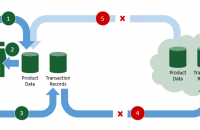Retail Guide: Selecting the Right ERP Software for Your Drugstore
 Software vendors come in all shapes and sizes, and it’s often difficult to know which one is the best suited to your particular needs. Do you go with the vendor that is small, specific, and extremely targeted to your niche, and accept the risk that they may be too specialized to stay in business to give you a good ten plus years out of your investment? Or do you pick the conservative route, choosing a big-brand vendor that has a generic solution that mostly does what you need and a customer base so large you’ll never get any personalized attention, in exchange for the confidence that they’ll be around forever?
Software vendors come in all shapes and sizes, and it’s often difficult to know which one is the best suited to your particular needs. Do you go with the vendor that is small, specific, and extremely targeted to your niche, and accept the risk that they may be too specialized to stay in business to give you a good ten plus years out of your investment? Or do you pick the conservative route, choosing a big-brand vendor that has a generic solution that mostly does what you need and a customer base so large you’ll never get any personalized attention, in exchange for the confidence that they’ll be around forever?
The question gets even harder for drugstore and pharmacy owners. Despite what a salesperson trying to pitch a generic solution will say, drugstores and pharmacies are not just regular retailers with a few special add-ons. There are several fundamental cornerstones that make drugstores different from any other retailer, and at the very least you want a software vendor that acknowledges that.
Big or small, specialized or generic, the questions you should be asking have to be built around identifying your business needs and business goals – to know if a software suite is right for your business, you have to establish (before you even start looking at vendors) what your must-haves are for software. Because every drugstore chain is unique even within the realm of their specific retail niche, it’s impossible to provide a checklist that will perfectly address every drugstore’s needs. There are some things that every drugstore chain absolutely has to demand from their software, however.
Does it Interface with Your RX Application and Government Databases?
This one is a no-brainer and should be the easiest way to eliminate software that will be a waste of your time and money as a drugstore. The RX Application that you use for prescription medication is one of those fundamental cornerstones of what makes you different from any other retailer – the first reason your customers come to you is for picking up prescription drugs. If the software isn’t already designed to talk to your RX Application, it isn’t suited to your business.
Similarly, drugstores have a responsibility to their community that other retailers do not – in order to help prevent substance abuse both from individuals and from those who would sell certain over-the-counter medication, drugstores need to be able to communicate with government databases so that they can alert your staff if a transaction is suspicious or an individual has been flagged at other local pharmacies.
Does it have the ability to help you create, manage, and track promotions?
Although customers often come in the first time to fill a prescription, what keeps them coming back is the purchase of non-prescription health and beauty items as well as other products. To keep yourself at top of mind and to ensure your customers are aware of good deals, you need to stay on top of your promotional activity. Most software vendors will claim their system handles this sort of thing – get granular about your specific needs to make sure they actually provide what you’re looking for.
You may have specific requirements, so be sure to come to the table with targeted questions. Drugstores often find they’re asking things like:
- Can the software run multiple overlapping promotions simultaneously?
- How easy would it be to send flyers to the customer addresses stored in the system?
- Can the software automatically ensure stock availability of the items currently being advertised as part of my promotions?
- Does the software have the ability to keep track of promotional pricing from my various vendors that I could be taking advantage of to run more sales?
How will the software handle the wide range of different products we sell?
Another major way in which drugstores are very different from other retailers is that it isn’t efficient, logical, or responsible to treat all of your products in the exact same way. Prescription medication, brand-name cold medicine, stationary and protein bars are all vastly different from each other in how they need to be treated.
Any software worth considering will already be prepared to handle that – if the vendor you’re talking to isn’t already knowledgeable about the complex product mix drugstores deal with ordering, stocking and selling, that’s a strong indication that their software will be an awkward fit for your business and that their implementation and support team might not come prepared with experience in working with drugstores. Some questions you may want to ask are:
- Can the software recognize and match item types to my store planogram?
- Will it understand which shelf space is dedicated to specific products, and which products are interchangeable?
- Does the software group product variations by supplier?
- If the products from that supplier are over-stocked and not everything fits into that particular supplier’s allocation shelf space, how would the software prioritize which product lines get pushed to the shelf?
- How do the automated processes for something like hair ties differ for something like heavy-duty painkillers? Can they walk you through the way the system handles it from the moment of ordering through to the sale to the customer, and then to an attempted return?
Come prepared with both pain-points and a wish list
 While the above questions will help you to eliminate retail software packages that would be a bad fit for your drugstore and pharmacy business, it’s a bit trickier to discern the differences between a good fit and the best fit. This is where you need to really understand what the current issues are with the system you’re using now, and to also identify what’s on your road map for new features and functionalities that are important to invest in to improve your ability to service your community and run a profitable business.
While the above questions will help you to eliminate retail software packages that would be a bad fit for your drugstore and pharmacy business, it’s a bit trickier to discern the differences between a good fit and the best fit. This is where you need to really understand what the current issues are with the system you’re using now, and to also identify what’s on your road map for new features and functionalities that are important to invest in to improve your ability to service your community and run a profitable business.
Do your research, talk to a vendor’s other drugstore clients if possible, but most importantly, establish a clear set of essential needs before you even begin the process – and then don’t let any vendors talk you out of those business requirements. You are not like any other retailer, and a software vendor that doesn’t understand that is trying to sell you a software solution that won’t accommodate that.
RECENT POSTS
 Retail Guide: Selecting the Right ERP Software for Your DrugstoreThere are some things that every drugstore and pharmacy [...]
Retail Guide: Selecting the Right ERP Software for Your DrugstoreThere are some things that every drugstore and pharmacy [...] A Quick Guide: How to Adapt to Change & Thrive During the Pandemic as a Liquor ChainThere are some things that every drugstore and pharmacy [...]
A Quick Guide: How to Adapt to Change & Thrive During the Pandemic as a Liquor ChainThere are some things that every drugstore and pharmacy [...] Cloud POS, Cloud ERP, and Hybrid Cloud POS Solutions for RetailWhen buying a POS system for retail, what's the [...]
Cloud POS, Cloud ERP, and Hybrid Cloud POS Solutions for RetailWhen buying a POS system for retail, what's the [...]